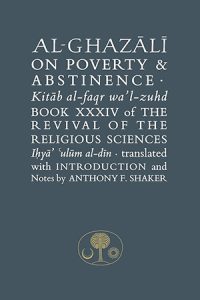Al-Ghazali on Poverty & Abstinence (Ihya Ulumuddin Series No. 34)

Author: Imām Al-Ghazali
Translator: Anthony F. Shaker
Publisher: Islamic Texts Society
Year of Publication: 2019
Print Length: 224 pages
Genre: Islamic Studies / Quranic Studies; Theology, Ethics and Philosophy; Science, Reflection & Self-Development; Qur’anic Reflection, Supplication & Prayers; Non-Fiction / Religious Studies
Topic: Allah ﷻ, Prophet Muhammad ﷺ, Islam, Qur’an, Human Nature & Character, Human Psyche, Islamic Psyche, Patience & Gratitude/Thankfulness, Poverty, Ethics & Morality, Spirituality
Al-Ghazali on Poverty and Abstinence is the thirty-fourth chapter of the Revival of the Religious Sciences (Ihya’ ‘Ulum al-Din), which is widely regarded as the greatest work of Muslim spirituality. In Al-Ghazali on Poverty and Abstinence, Abu Hamid al-Ghazali considers two themes dear to Islamic devotional literature: poverty and abstinence. Taking as his example the Prophet’s love for the poor, Ghazali explains that poverty is not simply an accidental state of destitution that might befall anyone but rather an inner acceptance of the Will of God and a form of abstinence for His sake. Thus the life of poverty described by Ghazali in Al-Ghazali on Poverty and Abstinence refers to what every devoted follower of the Prophet is meant to adopt whatever his or her outer state may be.
In this volume, the Islamic Texts Society has included the translation of Abu Hamid al-Ghazali’s own Introduction to the Revival of the Religious Sciences which gives the reasons that caused him to write the work, the structure of the whole of the Revival and places each of the chapters in the context of the others.
Table of Contents
Al-Ghazāli’s Introduction to the Revival of the Religious Sciences
Introduction
Notes to Introduction
THE BOOK OF POVERTY AND ABSTINENCE
Prologue
Part 1: On Poverty
1. An Exposition of the Reality of Poverty, the Different States of the Poor Person and his Names
2. A General Exposition of the Excellence of Poverty
3. An Exposition of the Particular Excellence of the Poor who are Contented, who are Satisfied and who are Sincere
4. An Exposition of Poverty’s Excellence over Wealth
5. An Exposition of the Norms of Propriety of the Poor Person in his Poverty
6. An Exposition of the Norms of Propriety of the Poor Person when Accepting an Unsolicited Offering
7. An Exposition of the Forbiddance of Unnecessary Begging and of the Norms or Propriety of the Poor Person Who Must Beg
8. An Exposition of the Amount of Wealth which Renders Begging Illicit
9. An Exposition of the States of Those Who Beg
Part 2: On Abstinence
10. An Exposition of the Reality of Abstinence
11. An Exposition of the Excellence of Abstinence
12. An Exposition of the Degrees of Abstinence, Its Divisions in Relation to Itself, to What Is Undesirable and to What Is Desirable
13. An Exposition of the Details of Abstinence with Respect to the Necessities of Life
14. An Exposition of the Signs of Abstinence
Notes
Appendix: Persons Cited in the Text
Bibliography
Index to Qur’ānic Quotations
General Index

Imām Abu Hamid al-Ghazali is a 11th century Muslim scholar. He was one of the most prominent and influential philosophers, theologians, jurists, and mystics of Sunni Islam. Al-Ghazālī was born at Ṭūs (near Mashhad in eastern Iran) and was educated there, then in Jorjān, and finally at Nishapur (Neyshābūr), where his teacher was al-Juwaynī, who earned the title of imām al-ḥaramayn (the imam of the two sacred cities of Mecca and Medina). He was active at a time when Sunni theology had just passed through its consolidation and entered a period of intense challenges from Shiite Ismâ’îlite theology and the Arabic tradition of Aristotelian philosophy (falsafa). Al-Ghazâlî understood the importance of falsafa and developed a complex response that rejected and condemned some of its teachings, while it also allowed him to accept and apply others. His great work, Iḥyāʾ ʿulūm al-dīn or Ihya Ulumuddin (“The Revival of the Religious Sciences”), made Sufism (Islamic mysticism) an acceptable part of orthodox Islam.
Source: https://plato.stanford.edu/entries/al-ghazali/
More from Imam al-Ghazali in this library, click here.

Anthony F. Shaker is a specialist in Islamicate and German philosophy. He has a BA in Sociology with Philosophy from Concordia University, Montreal, and both MA and PhD from Institute of Islamic Studies, McGill University, Montreal. He is the author of several studies including the only complete study of Sadr al-Din Qunawi. He is also the translator of both Al-Ghazali on Intention, Sincerity & Truthfulness and Al-Ghazali on Vigilance and Self-examination in the Islamic Texts Society’s al-Ghazali Series.
Source: https://independent.academia.edu/AnthonyShaker
More from Anthony F. Shaker in this library, click here.
